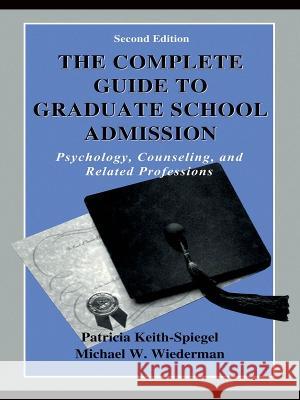The Complete Guide to Graduate School Admission: Psychology, Counseling, and Related Professions » książka
The Complete Guide to Graduate School Admission: Psychology, Counseling, and Related Professions
ISBN-13: 9780805831207 / Angielski / Twarda / 2000 / 296 str.
The Complete Guide to Graduate School Admission: Psychology, Counseling, and Related Professions
ISBN-13: 9780805831207 / Angielski / Twarda / 2000 / 296 str.
(netto: 676,35 VAT: 5%)
Najniższa cena z 30 dni: 654,86
ok. 22 dni roboczych.
Darmowa dostawa!
Should I go to graduate school? How do I choose where to apply? Are my grades and accomplishments good enough to get in? Who should I ask to write recommendation letters for me, and how should I approach these people? How do I write my "personal statement?" When will I hear my fate, and how should I make my final decision? These are just a few of the many questions to which this well-researched, thorough, and extremely user-friendly book offers answers. Students who are contemplating graduate training in psychology, counseling, and related fields are often apprehensive and confused about applying to graduate school, but this book takes the guesswork and anxiety out of the process.
The tone and features (such as the Q&A format, timeline for application-related tasks and activities, and special advice for special populations) that made the first edition so successful, eliciting hundreds of thank-you notes and e-mail messages to the author, are just as evident in this new edition. The book has been thoroughly updated to include coverage of new topics such as use of the internet and e-mail, as well as changing trends in the professions. The most obvious difference is that the book is now significantly shorter as a result of meticulous rewriting, making it even easier to use.
There have been attempts since the publication of the first edition to copy the format of this book, but none of the others have successfully duplicated the depth of research-based advice and the supportive style that make this book the guide of choice for thousands of graduate-school bound students and their advisors.
Should I go to graduate school? How do I choose where to apply? Are my grades and accomplishments good enough to get in? Who should I ask to write recommendation letters for me, and how should I approach these people? How do I write my "personal statement?" When will I hear my fate, and how should I make my final decision? These are just a few of the many questions to which this well-researched, thorough, and extremely user-friendly book offers answers. Students who are contemplating graduate training in psychology, counseling, and related fields are often apprehensive and confused about applying to graduate school, but this book takes the guesswork and anxiety out of the process.
The tone and features (such as the Q&A format, timeline for application-related tasks and activities, and special advice for special populations) that made the first edition so successful, eliciting hundreds of thank-you notes and e-mail messages to the author, are just as evident in this new edition. The book has been thoroughly updated to include coverage of new topics such as use of the internet and e-mail, as well as changing trends in the professions. The most obvious difference is that the book is now significantly shorter as a result of meticulous rewriting, making it even easier to use.
There have been attempts since the publication of the first edition to copy the format of this book, but none of the others have successfully duplicated the depth of research-based advice and the supportive style that make this book the guide of choice for thousands of graduate-school bound students and their advisors.











